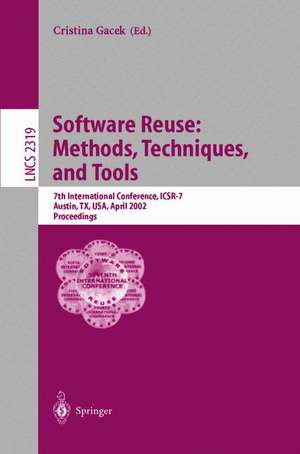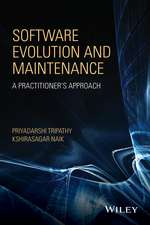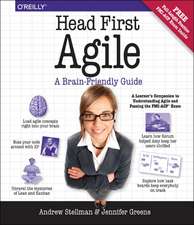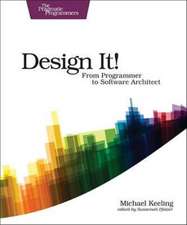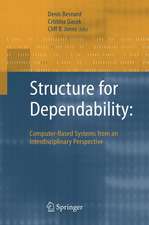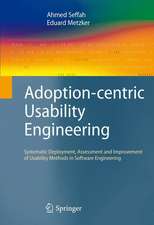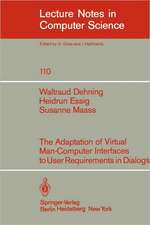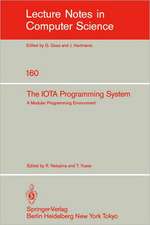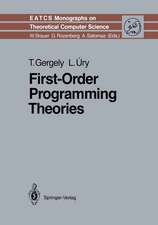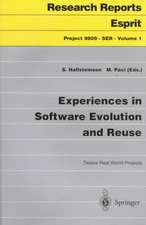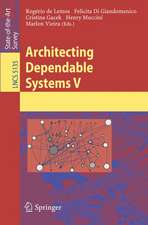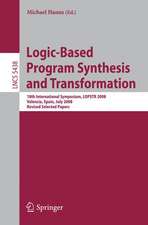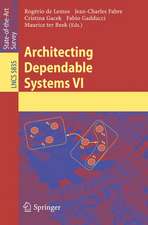Software Reuse: Methods, Techniques, and Tools: 7th International Conference, ICSR-7, Austin, TX, USA, April 15-19, 2002. Proceedings: Lecture Notes in Computer Science, cartea 2319
Editat de Cristina Gaceken Limba Engleză Paperback – 3 apr 2002
Din seria Lecture Notes in Computer Science
- 20%
 Preț: 1061.55 lei
Preț: 1061.55 lei - 20%
 Preț: 307.71 lei
Preț: 307.71 lei - 20%
 Preț: 438.69 lei
Preț: 438.69 lei - 20%
 Preț: 645.28 lei
Preț: 645.28 lei -
 Preț: 410.88 lei
Preț: 410.88 lei - 15%
 Preț: 580.46 lei
Preț: 580.46 lei - 17%
 Preț: 427.22 lei
Preț: 427.22 lei - 20%
 Preț: 596.46 lei
Preț: 596.46 lei -
 Preț: 449.57 lei
Preț: 449.57 lei - 20%
 Preț: 353.50 lei
Preț: 353.50 lei - 20%
 Preț: 1414.79 lei
Preț: 1414.79 lei - 20%
 Preț: 309.90 lei
Preț: 309.90 lei - 20%
 Preț: 583.40 lei
Preț: 583.40 lei - 20%
 Preț: 1075.26 lei
Preț: 1075.26 lei - 20%
 Preț: 310.26 lei
Preț: 310.26 lei - 20%
 Preț: 655.02 lei
Preț: 655.02 lei - 20%
 Preț: 580.93 lei
Preț: 580.93 lei - 20%
 Preț: 340.32 lei
Preț: 340.32 lei - 18%
 Preț: 938.83 lei
Preț: 938.83 lei - 20%
 Preț: 591.51 lei
Preț: 591.51 lei - 15%
 Preț: 438.59 lei
Preț: 438.59 lei - 20%
 Preț: 337.00 lei
Preț: 337.00 lei -
 Preț: 389.48 lei
Preț: 389.48 lei - 20%
 Preț: 607.39 lei
Preț: 607.39 lei - 20%
 Preț: 1024.44 lei
Preț: 1024.44 lei - 20%
 Preț: 579.30 lei
Preț: 579.30 lei - 20%
 Preț: 763.23 lei
Preț: 763.23 lei - 20%
 Preț: 453.32 lei
Preț: 453.32 lei - 20%
 Preț: 575.48 lei
Preț: 575.48 lei - 20%
 Preț: 585.88 lei
Preț: 585.88 lei - 20%
 Preț: 825.93 lei
Preț: 825.93 lei - 20%
 Preț: 763.23 lei
Preț: 763.23 lei - 17%
 Preț: 360.19 lei
Preț: 360.19 lei - 20%
 Preț: 1183.14 lei
Preț: 1183.14 lei - 20%
 Preț: 340.32 lei
Preț: 340.32 lei - 20%
 Preț: 504.57 lei
Preț: 504.57 lei - 20%
 Preț: 369.12 lei
Preț: 369.12 lei - 20%
 Preț: 583.40 lei
Preț: 583.40 lei - 20%
 Preț: 343.62 lei
Preț: 343.62 lei - 20%
 Preț: 350.21 lei
Preț: 350.21 lei - 20%
 Preț: 764.89 lei
Preț: 764.89 lei - 20%
 Preț: 583.40 lei
Preț: 583.40 lei - 20%
 Preț: 649.49 lei
Preț: 649.49 lei - 20%
 Preț: 341.95 lei
Preț: 341.95 lei - 20%
 Preț: 238.01 lei
Preț: 238.01 lei - 20%
 Preț: 538.29 lei
Preț: 538.29 lei
Preț: 336.21 lei
Preț vechi: 420.26 lei
-20% Nou
Puncte Express: 504
Preț estimativ în valută:
64.33€ • 67.35$ • 53.23£
64.33€ • 67.35$ • 53.23£
Carte tipărită la comandă
Livrare economică 07-21 aprilie
Preluare comenzi: 021 569.72.76
Specificații
ISBN-13: 9783540434832
ISBN-10: 3540434836
Pagini: 368
Ilustrații: XII, 356 p.
Dimensiuni: 155 x 233 x 19 mm
Greutate: 0.52 kg
Ediția:2002
Editura: Springer Berlin, Heidelberg
Colecția Springer
Seria Lecture Notes in Computer Science
Locul publicării:Berlin, Heidelberg, Germany
ISBN-10: 3540434836
Pagini: 368
Ilustrații: XII, 356 p.
Dimensiuni: 155 x 233 x 19 mm
Greutate: 0.52 kg
Ediția:2002
Editura: Springer Berlin, Heidelberg
Colecția Springer
Seria Lecture Notes in Computer Science
Locul publicării:Berlin, Heidelberg, Germany
Public țintă
ResearchCuprins
Integrating and Reusing GUI-Driven Applications.- Source Tree Composition.- Layered Development with (Unix) Dynamic Libraries.- Early-Reply Components: Concurrent Execution with Sequential Reasoning.- Concepts and Guidelines of Feature Modeling for Product Line Software Engineering.- Domain Modeling for World Wide Web Based Software Product Lines with UML.- Enhancing Component Reusability through Product Line Technology.- Modeling Variability with the Variation Point Model.- Reusing Open-Source Software and Practices: The Impact of Open-Source on Commercial Vendors.- Integrating Reference Architecture Definition and Reuse Investment Planning.- Control Localization in Domain Specific Translation.- Model Reuse with Metamodel-Based Transformations.- Generation of Text Search Applications for Databases. An Exercise on Domain Engineering.- Domain Networks in the Software Development Process.- Supporting Reusable Use Cases.- Project Management Knowledge Reuse through Scenario Models.- Adaptation of Coloured Petri Nets Models of Software Artifacts for Reuse.- Improving Hazard Classification through the Reuse of Descriptive Arguments.- Service Oriented Programming: A New Paradigm of Software Reuse.- An Empirical User Study of an Active Reuse Repository System.- Towards the Formalization of a Reusability Framework for Refactoring.- Service Facilities: Extending Abstract Factories to Decouple Advanced Dependencies.- Software Fortresses.- The Case against a Grand Unification Theory.- ICSR7 Young Researchers Workshop.- International Workshop on Reuse Economics.- Workshop on Generative Programming 2002 (GP2002).- ICSR7 Workshop on Component-Based Software Development Processes.- Industrial Experience with Product Line Approaches.- Workshop on Software Reuse and Agile Approaches.- Software Architecture Quality Analysis Methods.- Tutorial on Practical Product Line Scoping and Modeling.- Transformation Systems: Generative Reuse for Software Generation, Maintenance and Reengineering.- Component-Based Product-Line Engineering with the UML.- Building Reusable Test Assets for a Product Line.- Architecture-Centric Software Engineering.- Practical Strategies and Techniques for Adopting Software Product Lines.- Generative Programming: Methods, Techniques, and Applications Tutorial Abstract.
Caracteristici
Includes supplementary material: sn.pub/extras
